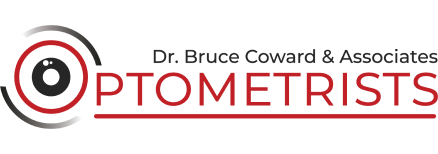Our top eyecare tips for healthy eyes

With a new year comes a renewed focus on personal health. This includes taking care of your eyes. Your vision is an important part of your overall health and is often an indicator that there may be something wrong in other parts of your body. But how do you maintain and protect your eye health? Let’s review some common eyecare tips to ensure you’re doing everything you can to keep your eyes healthy.
Get regular eye exams

Our eye exams in Ontario do more than just check how well you can see. Even people with perfect vision can experience eye health issues that can be detected during an eye exam, like glaucoma, and diabetes. Know your family health history and be sure to share it with our optometrist during your exam. This can help them better identify your risks and be on the lookout for specific eye health problems.
All our eyecare professionals are also fully trained to use a 3D OCT scan, which allows our optometrists to examine the individual tissue layers at the back of your eye, as well as measure the thickness of these layers to detect and accurately pinpoint any irregularities or eye conditions such as cataracts and macular degeneration in their early stages before visible symptoms show.
Remove your makeup

Never forget to remove your makeup at the end of the day, especially mascara and eyeliner and eyeshadow. This can cause irritation and even lead to infections if left on due to the glands in your eyelids becoming clogged. That’s why it’s important to also follow the recommended usage labels on your products, so you’re not putting any makeup near your eyes that has expired.
At the end of the day, use a cleanser and warm cloth to gently take off all your makeup. We recommend avoiding harsh chemicals or products with strong fragrances, which could also irritate your eyes.
Wash your hands frequently
We are all used to washing our hands since the pandemic hit, but did you know this does more than just protect you from viruses like Covid and flu? Washing your hands can prevent dirt and bacteria from entering your eyes, to avoid developing conditions like bacterial conjunctivitis.
We also strongly advise not sharing towels, contact lenses, or hygiene products to avoid spreading germs and bacteria between people.
Quit smoking
You know smoking is bad for your lungs, but did you know it can also contribute to a number of eye health issues? Smokers are twice as likely to develop macular degeneration and cataracts and are also at more risk of experiencing diabetic retinopathy, and glaucoma. It can also irritate dry eyes, reduce tear quality, and cause blurry vision.
As a dry eye specialist, we can help you find ways to manage your symptoms if you do experience dry eyes as a smoker, but the first port of call is always to quit first – you’ll start seeing the improvements soon after!
Eat foods rich in vitamins and nutrients

A healthy diet isn’t just good for your waistline, it’s also an important way to maintain good eye health. Make sure you are getting key nutrients in your diet, such as:
- Vitamin C from fruits like berries, and oranges and vegetables like bell peppers
- Vitamin E from nuts
- Omega-3 fatty acids from oily fish like salmon
- Zinc from sources like eggs and milk
- Lutein and zeaxanthin, found in dark green leafy vegetables
Use contacts lenses correctly
Contact lenses are a great way to change up your look from glasses, or to use for activities like sports, or certain social occasions. Using them comes with responsibility though, especially when it comes to maintaining good contact lens hygiene. Remember to always follow the guidelines that come with your contact lenses, as well as the ones provided by our optometrists.
To recap: you should only wear them for the recommended wear time, for example, if you wear daily disposables you shouldn’t don’t wear them longer than a day, and if you wear reusable lenses, switch to a fresh pair after their usage time is over. You should also never sleep in your lenses unless you have been prescribed a pair which is designed for that, as this can cause serious dry eye and can lead to infections.
Wear sunglasses
Sunglasses are the number one way you can protect yourself from the sun’s harmful UV rays, which in the long term will help prevent the development of age-related eye diseases like macular degeneration, and cataracts, and can even help protect you from skin cancer thanks to their coverage around the eye area. Remember to only wear sunglasses that offer 100% protection from UVA and UVB rays.
Monitor your blood sugar
One of the leading causes of vision loss in adults is diabetic retinopathy. If you don’t keep your blood sugar under control, you may quickly find yourself dealing with diabetes. Eat a healthy diet and have your insulin levels checked regularly to avoid experiencing constant spikes in your blood sugar. High levels can damage the blood vessels at the back of your eye, leading to permanent damage, and in some cases, if left uncontrolled and untreated, even sight loss.
Contact our optometrists in Ontario
We hope these tips helped! While you can do most of these at home, nothing replaces getting your routine eye exam. Ontario is home to our offices in Belleville, Brighton, Trenton and Picton, and our team of friendly and professional eyecare experts, and our investment in the latest diagnostic technology like OCT scans, mean when you come to see us, you’ll always get a complete picture of your vision and eye health. Remember, with OHIP we can also see children and offer eye exams for seniors in Ontario.
To book your eye exam or for more eyecare tips, contact us today and speak to one of our optometrists in Belleville, Brighton, Trenton, or Picton.


